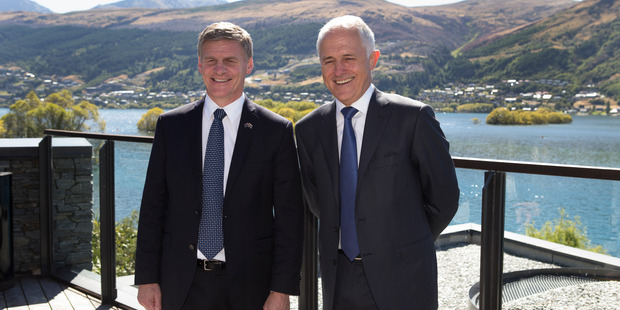
Prime Minister Bill English has conceded that New Zealand is considered a "soft entry point" for migration to Australia.
He says he wants to investigate the issue, because it was often raised by Australian Government officials.
But he says his Government has no plan to change the two countries' reciprocal travel arrangements, which make it easy to move between to the two countries.
The New Zealand Government has expressed disappointment with recent changes in Australia which will make it harder to get citizenship and more expensive to attend university.
Labour and New Zealand First say New Zealand has partly brought the problem on itself because it had become a "back-door" route to Australia.
This was driving some of the Australian Government's increasingly tough policies on expat Kiwis, they said.
Speaking at his weekly press conference today, Mr English said the concern that New Zealand was a soft entry point had come up in discussions with Australia about establishing a common border.
"We do want to look into the issue because the Australian authorities have raised that in the past.
"We are confident that our immigration and border control is sound, and certainly meets our expectations. But the fact is New Zealanders have always been able to move to Australia. There's no suggestion that is going to change.
"We would like to understand precisely what their concern is. Because there's no evidence that the New Zealanders moving to Australia constitute some unique or special burden on Australia."
The issue was not raised during a visit to Sydney by Foreign Minister Gerry Brownlee last week, but Mr English said it "commonly circulates" among Australian officials.
He did not know how this concern could be resolved, partly because it had been "quite hard to pin down exactly what the problem is".
Australia's concerns that Pacific Islanders could use New Zealand as an alternative route into Australia influenced tighter immigration rules in 2001.
Mr English also said today there was likely to be more uncertainty ahead for Kiwis living across the Tasman.
While he had not been briefed about any further proposals by the Australian Government which could affect expatriate New Zealanders, he said economic woes and an "Australia First" approach could lead to further fallout.
"If you look at their media ... part of their political environment at the moment is a pretty strong focus on non-Australians and on Australia First policies from both political parties.
"If you combine that with the fact that they've got government deficits ... then you can see how the kind of decision we got last week [on university fees] arises."
Mr English said there had been a lot of recent publicity in Australia about the number of non-Australians on welfare, which he said signalled "an ongoing focus" on migrants' entitlements.
"We want to make sure we have a good close relationship with them so we know what's happening," he said.
Some immigration experts have suggested that Australian states could soon charge Kiwi citizens to send their children to primary or secondary schools.
Mr English said that was "speculation", adding that it would be unusual for state government to pursue such a move, he said.













